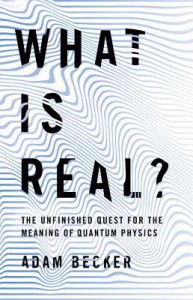Quantum Ontology: "What is Real - The Unfinished Quest for the Meaning of Quantum Physics" by Adam Becker

The Universal-Wave-Function vs. The Pilot-Schrödinger-Wave-Function vs. the Collapsing-Schrödinger-Wave-function as a Stab at Explaining Reality.
The diversity of possible comments on this book reflects ironically the Everett paradigm of quantum ontology. There are as many views of reality as there are observers. Thankfully in all instances, given the depth of some of the possible interpretations, the interaction of the observer state wave and that of the rest of the universe is extremely asymmetrical - the universe has a great effect on the observer but the latter's effect on the universe is mercifully, infinitesimally small. There is no doubt that the philosophical implications of the developments in modern scientific thinking are in lagging mode. This is because of the extreme complexities of the formalisms created to describe the reality as seen by human observers with a certain evolved sense of perception. The modern philosopher has to tread wearily through the theory before emerging tired and almost at wit's end to be in a position to even expound a valid opinion, least of all an emerging new philosophy, on the ontological basis of the quantum world. This is the first time I’ve read a book on Quantum Mechanics wherein three of the major outlier physicists appear: David Bohm, Hugh Everett III, and John Stewart Bell.
If you're into the Measurement Problem in Quantum Mechanics, read on.
 5
5



